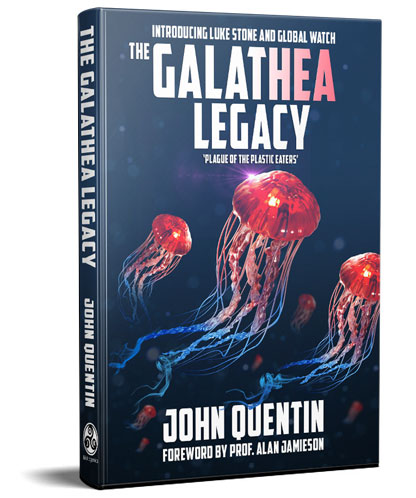John Quentin’s profound, prophetic third novel, The Galathea Legacy, dives deep into an environmental blight from which nowhere is immune. It also sounds a stark warning to businesses and scientists attempting to solve global environmental problems. Warped vision, morals and ethics, ignorance, hubris and loss of control can lead to solutions causing more harm than the problems themselves. The bigger the problem, the more dreadful is the legacy of failure to solve it: such is The Galathea Legacy.
” We’ve all seen what can happen if you experiment with microbes, maybe with the best intentions, or because it seems like a good idea, or just to satisfy curiosity, and they’re released into the environment. It doesn’t matter if it’s deliberate or by accident, the consequences can be apocalyptic.”
Millions of tonnes and billions of pieces of plastic pollute the world’s water. It is in groundwater, ponds, lakes, streams, rivers, seas, even the deepest parts of the great oceans. Nowhere is free from this very modern scourge. Okeanos Global Corporation intends to dominate the lucrative clean-up industry. They have invested years of work and multi-millions to develop engineered microbes designed to bio-degrade plastic polymers, not just in chemical recycling plants but out in the environment, and they are on the verge of success. The greatest threats to their plan come from hostile public opinion, from misjudgement and errors on their part, which they can influence and control, and from disturbed nature itself, over which they have no control.
On the floor of The Galathea Depth, an area of the Philippine Trench more than ten kilometres under the surface of the Pacific Ocean, lies a potentially apocalyptic legacy of pollution that is bizarrely both natural and unnatural, yet somehow sadly inevitable. What began with the intent to clean up the oceans could end up cleaning them out, possibly destroying most life on Earth in the process.
The UN’s Global Watch Ship Tethys abandons its eventful plastic pollution data gathering expedition in the Mariana Trench to make a clandestine rendezvous. This triggers a train of events that lead to oceanographer Luke Stone and his colleagues taking their Deep Submergence Vessels into the unexplored Galathea Depth, searching. What they discover is dreadful beyond imagination. Meanwhile, Okeanos Global Corporation will do whatever it takes, however extreme, to keep their terrifying secrets hidden from view.
It seems this is only the first battle that Global Watch and others will have to fight to thwart Okeanos Global Corporation’s ruthless ambition to become the most powerful, influential corporation in history.
The Galathea Legacy confronts the issues of plastic waste in the oceans and bioengineered plastic-degrading bacteria together, head on, for the first time. Works such as John Varley’s ‘Slow Apocalypse’, Kevin J. Anderson and Doug Beason’s ‘Ill Wind’ and R. Scott Reiss’ ‘Black Monday’ focus on oil-degrading microbes and the end of oil. The possibility of an extra-terrestrial pathogen mutating to attack rubber and plastic makes a cameo appearance at the end of Michael Crichton’s ‘The Andromeda Strain’. Closest, from 1971, comes Kit Pedler and Gerry Davis’ visionary ‘Mutant 59 – The Plastic Eaters’, which deals with a localised reanimation of an accidentally created, forgotten, dormant bacterium that attacks plastic. The Galathea Legacy is unlike any of these, being contemporary, global in outlook, and completely fresh. It is unique in every respect.
Plastic pollution is everywhere. Its legacy of litter is visible on every continent, island, river, sea and ocean. It is visible in deepest, most inaccessible, least explored and understood environment on earth: the deep ocean trenches. The Galathea Legacy explores not only the problem of plastic pollution but also the complex, challenging environments where the battle against the blight has only just begun. Going to the heart of both issues, it is informed and influential, profound and prophetic. The oceans’ health is inextricably linked to humanity’s health and future. It seems that the battle in the Galathea Depth is just one theatre in the worldwide war to protect humanity’s future.



